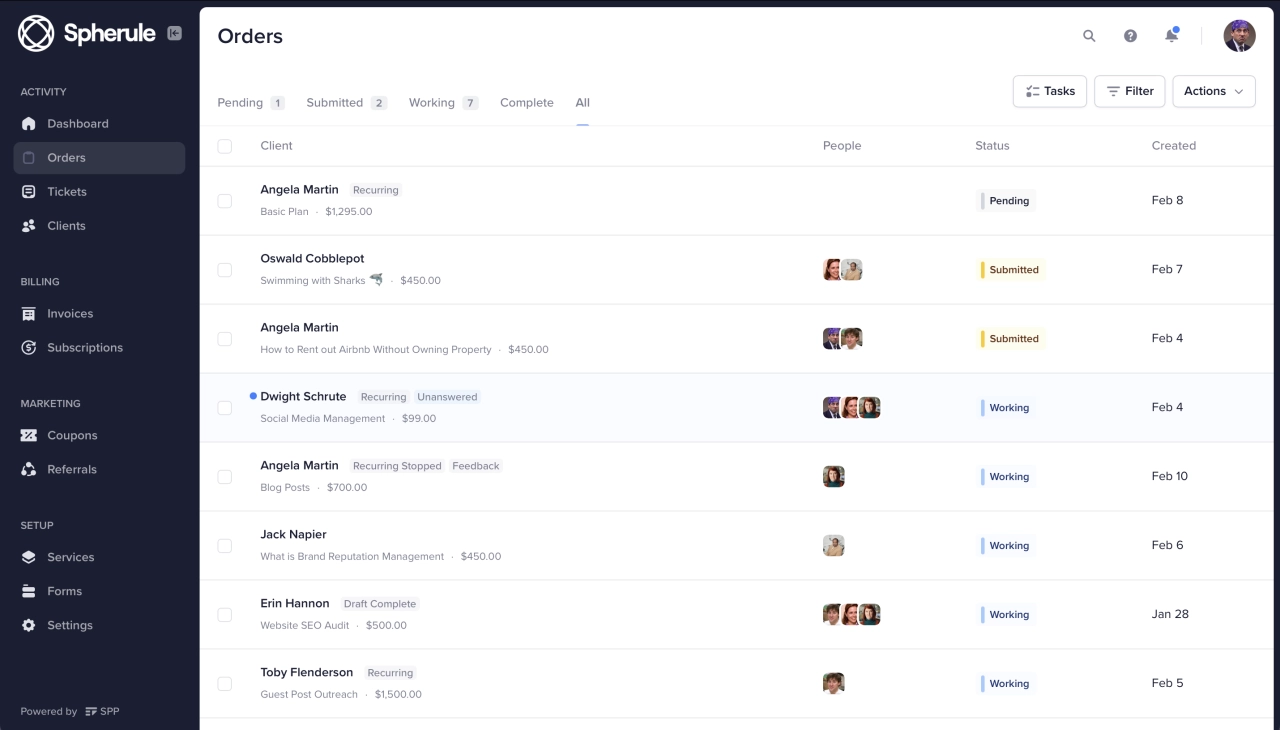- Micromanagement can be detrimental to employee morale and productivity, as it signals a lack of trust in their abilities and limits their autonomy.
- To avoid micromanagement, managers can focus on setting clear expectations and goals, providing support and resources, and giving employees the freedom to experiment and make mistakes.
- By fostering a culture of trust and empowerment, managers can build stronger relationships with their teams and ultimately drive better results.
Whether you are just launching an agency business or have been managing one for years, it's crucial to recognize the signs of micromanagement and learn how to avoid being a micromanaging boss.
What happens otherwise? Your employees may leave, clients could be lost, and your business might suffer. Continue reading to learn how to identify micromanagement signs and address this problem.
What are common signs of micromanagement?
Micromanagement is a prevalent issue in agencies, often stemming from deep-seated psychological factors that drive leaders to exert excessive control over their teams. Understanding these underlying reasons is the first step toward addressing and mitigating this counterproductive behavior.
The two main psychological reasons behind micromanagement are:
Fear of failure: One of the primary drivers of micromanagement is the fear of failure. Agency leaders may feel personally responsible for every aspect of a project, leading them to oversee even minor details to avoid potential mistakes. This fear can be paralyzing, causing managers to intervene in tasks that should be delegated.
Lack of trust: Micromanagement often arises from a lack of trust in team members’ abilities. Leaders may doubt their employees’ competence, leading to constant oversight and interference. This lack of trust can create a self-fulfilling prophecy, where employees feel undervalued and less motivated to perform at their best.
Role of personal insecurities and self-image
Personal insecurities play a significant role in micromanagement behaviors. Leaders who struggle with self-doubt may feel the need to assert control to validate their worth. This desire for validation can manifest as excessive involvement in tasks, seeking to prove their value through constant intervention. Additionally, a fragile self-image can lead managers to avoid delegation, fearing that others' successes might diminish their own perceived importance.
Fear of losing control and desire for perfection
Finally, there are two additional reasons why agency owners may micromanage their team:
Fear of losing control: Micromanagers often fear losing control over projects or outcomes. This fear drives them to maintain a tight grip on all aspects of the work, believing that only they can ensure success. However, this approach often backfires, leading to inefficiencies and stifled creativity.
Desire for perfection: The pursuit of perfection can also fuel micromanagement. Leaders may insist on meticulous oversight to achieve flawless results, failing to recognize that perfection is often unattainable and can hinder progress. This desire can create an environment where innovation is stifled, as employees fear taking risks or making mistakes.
By recognizing these underlying psychological factors, agencies can take proactive steps to address micromanagement. Building trust, fostering a culture of empowerment, and encouraging open communication can help mitigate these behaviors, leading to a more productive and positive work environment.
Psychological effects of micromanagement
Many micromanagers are not aware that their actions have a negative effect on their employees. Sadly, the effects can lead to long-term issues for the entire company, as a study published by the Journal of Experimental Psychology in 2011 reveals. People who believe to be watched for every task on their to-do list perform worse than their unwatched counterparts.

In some cases, the micromanaging tendencies lead to burnout due to employees staying after hours to remain on top of their work. This should be a clear sign they are struggling to handle the tasks assigned—and a good manager should realize this.
Not only will these employees burn out at some point, nobody enjoys doing mundane tasks that bring little benefit to the agency. As an agency owner, you should create an environment where employees feel appreciated, but also don’t succumb to massive workloads that should be distributed among multiple workers.
Concrete examples of micromanagement
At this point it should be clear how a micromanager thinks. Let’s still look at a few specific examples of someone exhibiting their micromanager tendencies to make things crystal clear:
Asking for constant updates: Your manager or boss regularly sends a message on Slack asking for status updates. Is it done yet? How’s it going? A clear sign of an experienced micromanager at work.
No clear instructions: Micromanagers may look like they have everything under control, but they often ask impossible things of their employees without giving clear instructions. Instead, they think you can read their mind, and know exactly what they want.
Decision making is not allowed: Those looking to handle small decisions will hit a wall if they’re dealing with a micromanager. Even the smallest decision has to be greenlit, often causing delays and frustrations for the entire team.
Overly obsessive tracking: If you pay your employees and contractors by the hour, it makes sense to use a software for attendance tracking. It makes it much easier to calculate the enamuration. But you shouldn’t abuse the tracking in order to see when they are online, and use that information against them.
The boss has to be in CC: I’ve seen how traditional agencies operate, and many of them have upwards of ten people (or more) in CC, one of them being the boss. They feel the need to be included in every communication, but do they actually read everything?
Creativity takes a back seat: Some employees are naturally creative, such as designers or contractors in a video marketing company. They need a certain level of freedom to express it, but a micromanager wouldn’t allow that. These employees feel like they have no power, and will not stick around long-term.
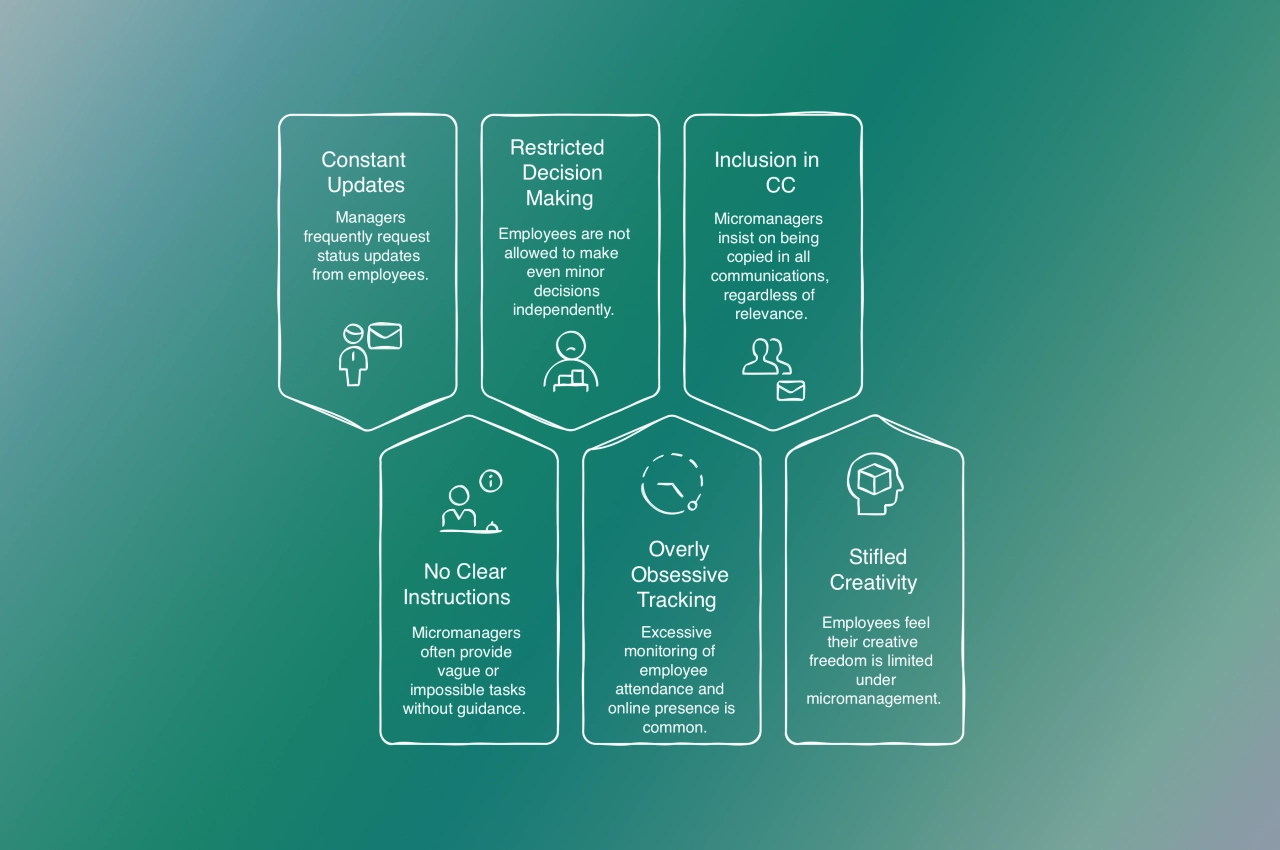
If all this sounds very familiar, it’s time to re-evaluate your role as a boss, and stop managing people in an authorative way.
5 ways to stop being a micromanager
Based on the signs and examples up until now, does it sound like you’re a micromanager? Don’t worry, we have prepared five ways micromanagers can end their force of habit below.
1. Use a project management tool
Project management is one of the most challenging aspects of running a service business. With so many working components necessary to ensure the timely deliverance of services, anything that can facilitate service completion without distracting staff is essential for success.
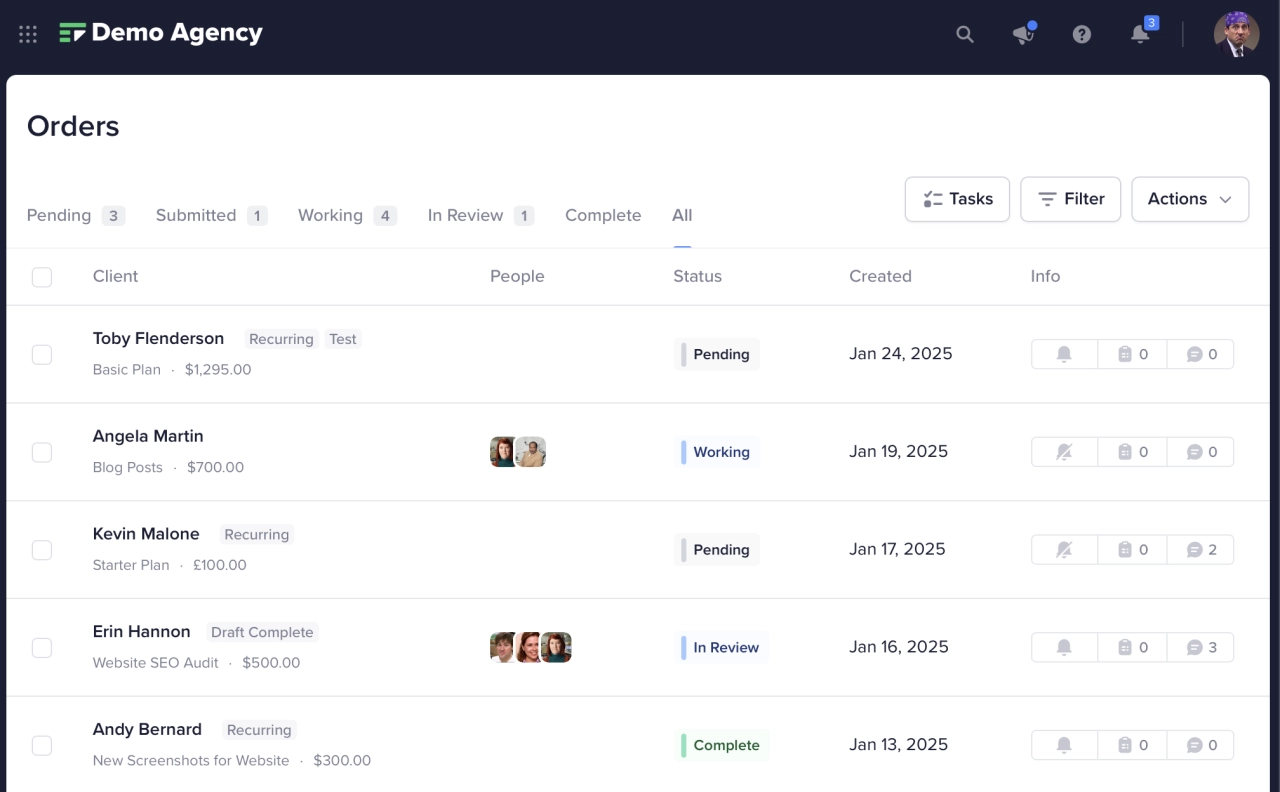
The SPP dashboard shows new orders automatically on your dashboard. You’ll also observe the progress of each order in real-time. This means any time a customer makes a payment, fills out a form, or sends a message, you’ll see everything that’s happening in one easily accessible location.
You can also customize the way you automatically request information. If you need some specific data from your client to complete an order, you can set a trigger that automatically sends a request for that information each time the service is ordered.
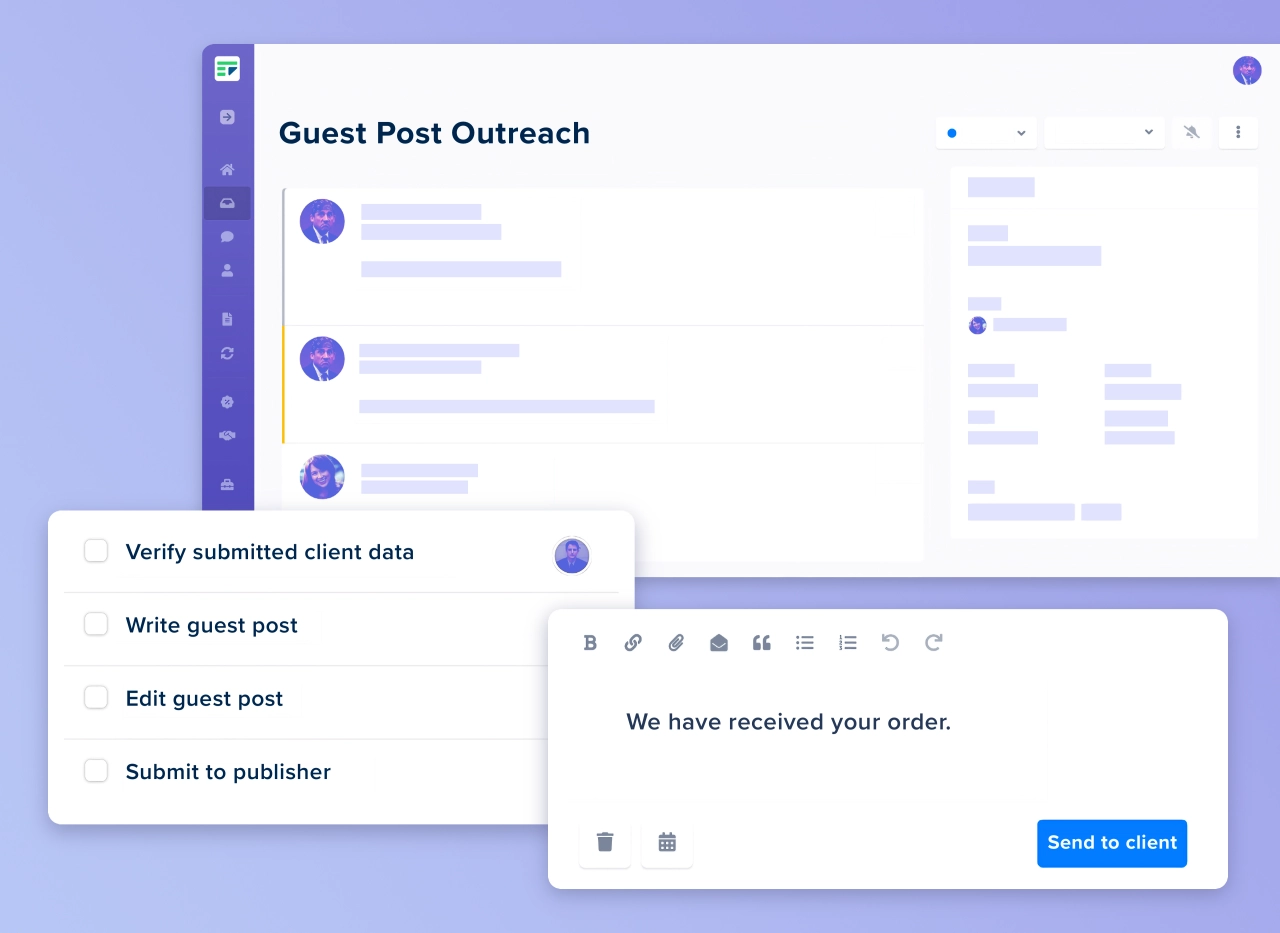
Stay on top of your projects and get your tasks done on time.
You’ll set parameters as well, allowing all or specific staff members to access this information. All of this is done automatically, meaning once you set the system to your preferences, you know your projects have a process in place to fulfil client orders without the need for stressful micromanagement processes.
2. Document all communications
Searching through thousands of emails for a single message is a hassle no one needs. Instead, SPP keeps all of your messages in a centralized location.
Each time your client receives a message in their order, they receive a notification via email. The client can then respond directly via email. But the correspondence is all documented in their order, meaning your team can message them back, and you can observe the back and forth communication.
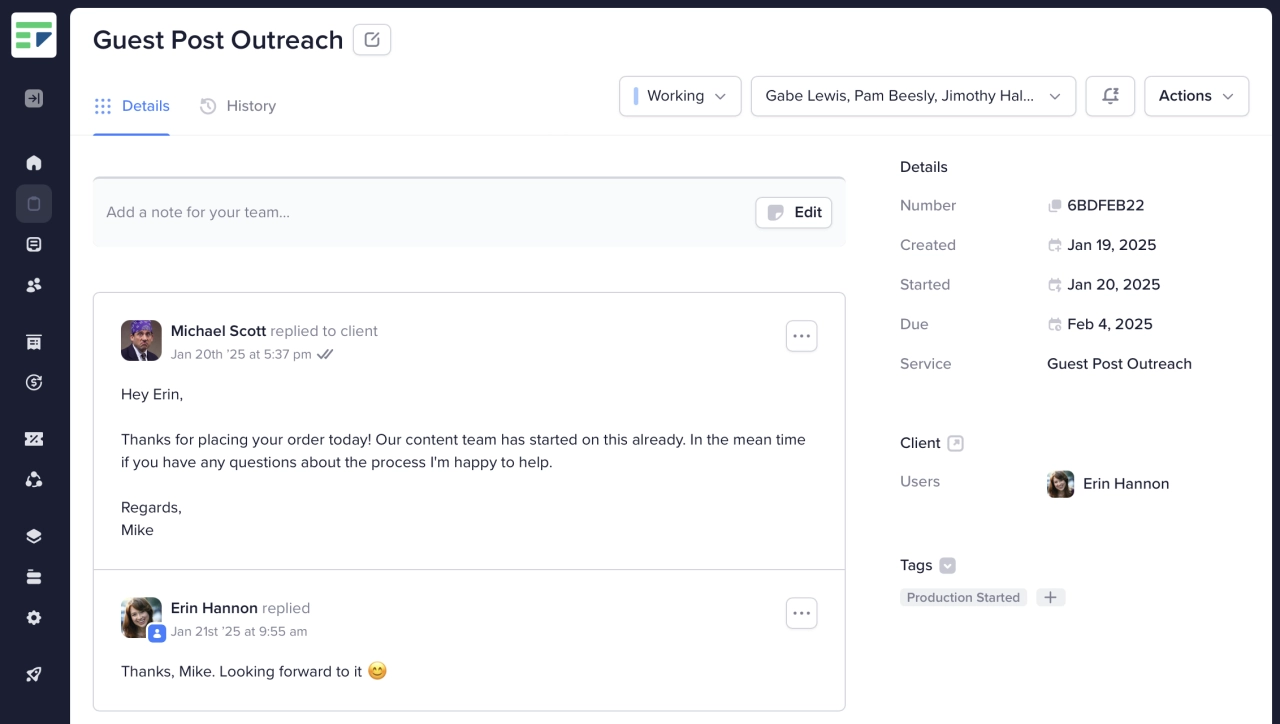
With this feature, you’ll have a clear history of who said what and when readily available to observe without disrupting the workflow. Thus, you’ll avoid having to reach out to your team any time you want some insight regarding how they’re interacting with your clients.
3. Auto-assign team members to orders
When you know one or more members of your team are rock stars at fulfilling certain types of orders, it makes sense to allocate those orders to those individuals. Here’s where managing your team with SPP can improve the quality of your services without forcing you to micromanage your staff’s actions.
For example, if you have someone excellent at writing long-form content, you’ll want to assign any long-form content orders to them automatically. You already know they’re going to fulfill the order properly. So this minimizes your need to micromanage by guaranteeing you’re delegating the tasks to the most suited person.
You set the roles for your team. Then, they’re assigned to fulfill specific orders that relate to their expertise. This results in the right orders getting assigned to the right person, and the orders are completed without the need to micromanage your team.
4. Monitor while avoiding micromanagement
Having SPP’s centralized system in place means you’re keeping the positive aspects of micromanagement while abandoning the features that can adversely impact your team. You still have control over operations, maintain accurate knowledge regarding your business, communicate effectively, and keep complex and custom operation reliable as they’re executed.
The client portal will rid you of the most common micromanagement problems, as well. You’ll have more time to focus on scaling your business without having to bother your employees. In turn, you’ll maintain employee trust.
Avoiding micromanagement means you’re avoiding burnouts. As a result, you’ll maintain skilled employee retention, adding value to your business as it scales.
Instead of breeding resentment in your business, you’re learning to depend on the valuable members of your team. And this is a scalable management style that can grow with your business.
5. Delegate and train employees
The art of delegating effectively should be learned by any agency owner if they want to micromanage less, free up more of their time, and focus on important tasks. Sadly, many agency owners lack delegation skills, and never learn how to stop doing everything themselves.
The reasons for that can be that the owner might not have had the best experience delegating tasks before, or that they simply think that their team cannot handle the tasks.
That being said, here are a few things to keep in mind:
delegation skills need to be learned and earned
hire smart people who are able of handling your tasks
let them make mistakes, and learn from them
have a mentorship program in place
Once you follow these tips, you’ll be able to focus on important agency tasks, knowing that your team has your back.
The best alternative to micromanagement
At this point you should be well on your way to stop micromanaging everyone. After all, micromanagement can stifle creativity and hinder productivity within your agency. An effective alternative is macromanagement, which focuses on the bigger picture and empowers employees to take ownership of their tasks.
Macromanagement explained
Macromanagement involves setting clear goals and providing the necessary resources, then trusting employees to achieve these objectives independently. This approach fosters a culture of autonomy and accountability, allowing team members to leverage their strengths and innovate.
Let’s look at the benefits of macromanagement:
Enhanced Creativity: Employees feel empowered to explore new ideas and solutions, driving innovation.
Improved Morale: Trusting employees boosts morale and job satisfaction, reducing turnover rates.
Increased Efficiency: With clear goals and autonomy, employees can streamline processes and focus on outcomes rather than minutiae.
Transitioning to macromanagement
If you want to switch from micro to macromanagement, follow these steps:
Set clear goals: Define objectives and communicate them clearly to your team to ensure everyone understands the desired outcomes.
Provide resources: Equip your team with the necessary tools and information to succeed.
Trust and delegate: Assign tasks based on strengths and trust employees to deliver without constant oversight.
Regular check-ins: Schedule periodic meetings to discuss progress and offer support, rather than dictating every step.
Encourage feedback: Create an open environment where employees feel comfortable sharing ideas and concerns.
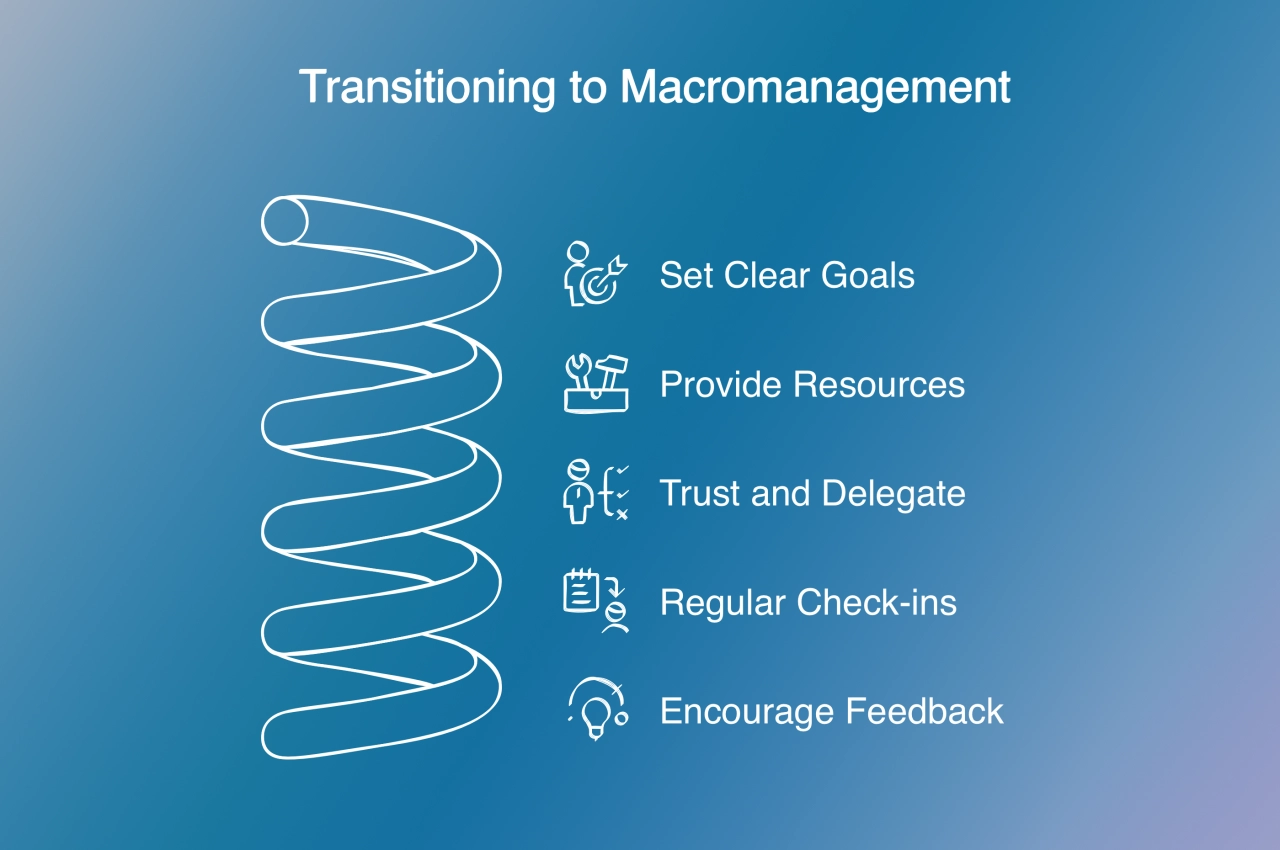
By adopting macromanagement, agencies can cultivate a more productive and innovative work environment, ultimately leading to better outcomes and happier teams.
Conclusion
There are many ways to grow an agency, but doing so through micromanagement isn’t an effective one. Even though being a micromanager can be beneficial in some instances, most of the time, it’s a managerial method characterized by damaged productivity and a lack of trust. With this being the case, making the switch to SPP is an easy choice.
At SPP, we’re helping our users manage their teams and clients without forcing them to resort to outdated practices. Instead, they use modern and effective management styles that demonstrate strong leadership. As a result, our clients are experiencing boosts in their efficiency, higher rates of skilled staff retention, and millions of dollars in projects being completed each week.





